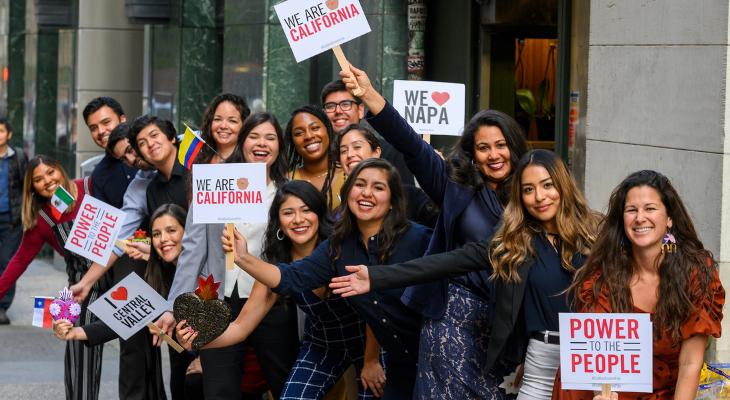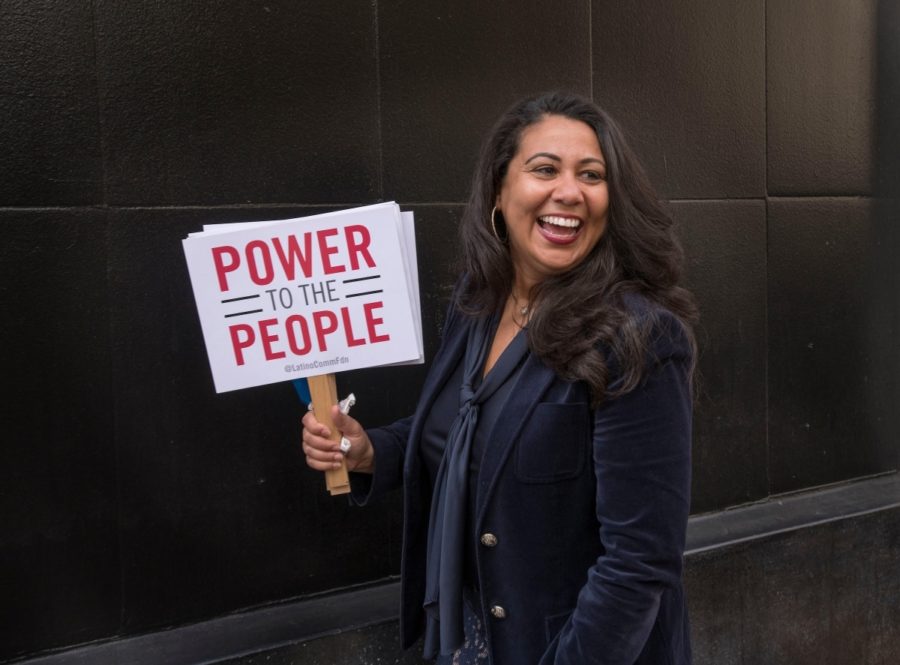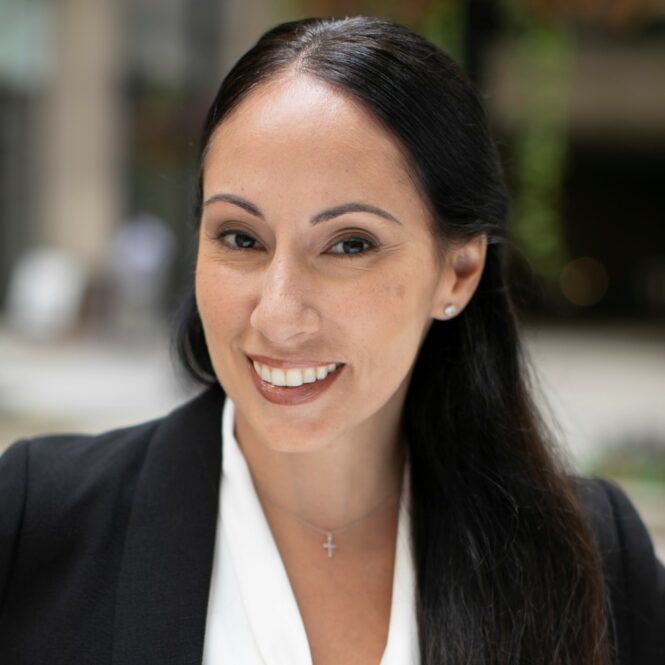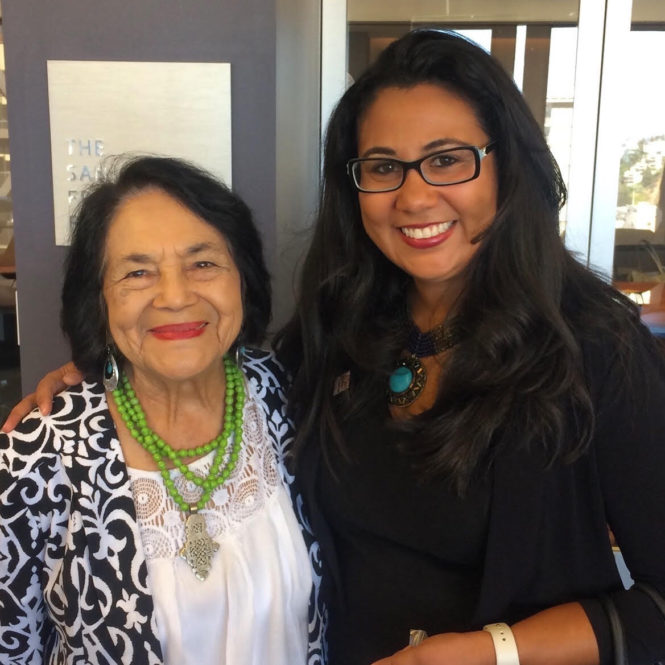In Diverse Latino Communities, a Call to Philanthropy Rooted in Love
April 1, 2022

On Wednesday, September 28, Jacqueline Martinez Garcel was awarded the Social Impact Award, presented by Google at the Power of Women event. To learn more about the honorees and the event, read the announcement in Variety.
As CEO of the San Francisco-based Latino Community Foundation, Jacqueline Martinez Garcel has a unique perspective on the diversity and power of California’s growing Latino/Latinx communities, the largest ethnic group in the nation’s most populous state. The foundation is a nonpartisan organization dedicated to building a network of civically engaged philanthropists, increasing Latino participation in the political process and investing in Latino-led organizations. A total of 7.9 million Latinos are eligible to vote in California, more than any other state in the nation, and Garcel and her team are committed to uplifting their voices.
The foundation is making an impact. Founded in 1989 as part of the United Way of the Bay Area, the organization charted its own course in 2016 and in recent years has moved more than $20 million into a network of 150 grassroots, Latino-led community nonprofits. “They are the group who has received historically less than 1.1% of all philanthropic dollars,” Garcel notes. “Trying to undo that inequity is really why LCF was created.”
In a recent conversation with Janett I. Cordovés, Director of Higher Education Partnerships at IA, Garcel spoke about her work, the religious diversity she sees in California’s Latino communities, and how faith helped shape her journey to leadership.
Janett I. Cordovés: Your Twitter bio includes a quote from the book of Micah in the Bible. Can you tell us why you chose that verse?
Share
Related Articles
American Civic Life
Racial Equity
Immigrant Faith Communities On Rooting Out Anti-Black Racism
American Civic Life

Jacqueline Martinez Garcel. Courtesy photo.
Jacqueline Martinez Garcel: Every year I go through Scripture again, and I’m landing on Micah right now. (Micah 6:8: “What does the Lord require of you? To act justly and love mercy and walk humbly with your God.”) When I joined the Latino Community Foundation, this was a calling for me. I was born and raised in New York City. I was born in Washington Heights, my parents are Dominican, and so when I was asked if I wanted to come run this foundation, it was really a leap of faith for me. Everything that I knew, that I loved was in the East Coast, and I remember sharing this with my pastor and my elders, (asking) “Should I make this move?”
But there are moments where God just stretches you and takes you out of your comfort zone and says, “Go.” And when I changed my bio up in Twitter, it was so important to me to remember that this walk wasn’t a job, it was a calling for justice and equity for our communities. I made the move in 2015. Part of the reason was what was happening in the political environment that we were living in. Trump had announced that he was running for office and he did it in a way that was really anti-Latino, anti-immigrant. And it just reminded me of the book of Esther, and all those places in Scripture where there is a group of people who are demonized and criminalized.
So, “seek justice and walk humbly with your God” is what I know to be how we serve, and how we live our faith. It’s not just a bunch of words, or a religious experience, it’s a relationship with your Creator, and understanding what you’re called to do is part of the journey.

JC: That’s beautiful, and it’s so important to lead and be authentic with our values and our beliefs. As you know, the Latino population is quite diverse in many ways, as well as religious. And so how does your faith create space for engagement with our Latinx Muslim brothers and sisters, our Jewish Latinx brothers and sisters, our non-religious brothers and sisters? And how does that impact your work?
Garcel: I love that question. And even within Christianity, there’s still so much division. I’ll start there because it’s the closest to my heart. I was brought up Catholic, and at a young age, I was invited to join a Bible study at a Baptist church, and I remember my mom’s reaction was, “You can’t go there.” Her Catholicism — the saints, Virgin Mary, all of that — was so important. Fast forward, I went to college, and I felt like I needed to be set free in terms of understanding, and it took me down a journey where I did study Hinduism and Buddhism, and just came back to Christianity. I was reading a book by C.S. Lewis, “Mere Christianity,” and it took me back to the basics, and I found my way in my own journey. I questioned and wrestled a lot. But what kept me moving forward were communities that embraced me, that didn’t judge me for asking fundamental questions about who God was, and why Jesus — all of it. And I learned from that experience that we all come to a place where we question the fundamentals.
So when it comes to work, and my beliefs, I think it’s critically important that we open those spaces for folks from all walks of faith to be able to find the places that unify them.
So when it comes to work, and my beliefs, I think it’s critically important that we open those spaces for folks from all walks of faith to be able to find the places that unify them.
When it comes to my Jewish brothers and sisters, there’s a foundational belief that we believe in. It’s the same God of Abraham, Jacob, and Isaac. Yes, there’s a difference in the New Testament and who Jesus said he was, but there’s so much shared knowledge and history that I feel like it when we go to those places, it builds a deep bond — and respect.
And Muslims, same thing, right? So that shared history, that shared knowledge, is such an important starting point for us to find our way back to the basics. And you know, when it comes to religions that are not tied to Abraham, there are fundamentals that also unite us as, like the moral obligations that we have towards one another, to act kindly and justly and seek equity for each other, to love one another. Justice and love are like the pillars that hold it all together for me. Love is something very tangible, that really unites people, and creates the change that we want to see in our own lives and in the lives of the communities that we serve and care about.
Justice and love are the pillars that hold it all together for me. Love is something very tangible, that really unites people, and creates the change that we want to see in our own lives and in the lives of the communities that we serve and care about. — Jacqueline Martinez Garcel, CEO, Latino Community Foundation
Justice and love are the pillars that hold it all together for me. Love is something very tangible, that really unites people, and creates the change that we want to see in our own lives and in the lives of the communities that we serve and care about. — Jacqueline Martinez Garcel, CEO, Latino Community Foundation
I always say to my brothers and sisters in Christianity: when people call each other ‘believers,’ I ask ‘believers in what?’ What does it mean to be a brother or sister?
JC: At IA, we really focus on the positive engagement of religious communities and non-religious communities and working towards the common good. And we know that there are areas of divisiveness, but our work really calls us to what unites us. As I learn more about the Latino Community Foundation, two of the goals you talk about are civic power and economic power. Can you talk to us about the religiously affiliated and non-religiously affiliated organizations that you work with for the common good?
Garcel: It’s mostly non-religious organizations that we work with. When you sit down with some of these grassroot leaders, that calling that I was mentioning, it’s embedded in them. They don’t make enough money to move the types of mountains that they move for the community. So there is something far deeper and bigger than themselves that is driving them. Whenever we have our healing circles, for example, that spiritual healing that needs to happen.
We work with organizations like Faith in the Valley that is a faith-based organization, and PICO, which is another faith-based organization. And, again, the themes of justice and love are what unites us.

Civil rights leader Dolores Huerta, left, with Latino Community Foundation CEO Jacqueline Martinez Garcel
I do want to come back to the the environment that we’ve been working in for the last five years, because it’s been really challenging. (When we speak of ) civic and economic power, the word power is used through Scripture a lot. Even this morning, the verse of the day was, “the power of the Spirit that moves us to do the impossible.”
It was important for me when when we changed our mission to use that word, but begin to redefine it. Because what we don’t want is for Latinos — who now make up a plurality in the state of California, and people say there’s power in our numbers — but that power can be easily misguided.
It’s easy to imitate how power has been used by other groups. And so taking that word power, but rooting it in the values that we’ve been passed down through our culture: so serving one another, serving community, being there for your neighbor. My parents were Dominican, and they moved into a neighborhood that was predominantly Jewish and Puerto Rican and Black. And it was their neighbors that helped them get the job, get the apartment, put us in school.They didn’t know the language. My father’s Black Dominican, he came in the late ’60s in the middle of the Civil Rights Movement, but he was Dominican, so he didn’t know what that all meant for him. But it was his neighbors that allowed him to kind of find his grounding.
So when we think about power, it’s going back to that place in us, that agency that we all have to make change happen, but doing it for the greater good. When I think about our team, it’s shared leadership.
The mission is that Latinos own their power in numbers to influence civic work — paying it forward. We have a whole giving circle network that’s about creating a new table, a new platform for Latinos, first generation, like me. I went to college. How do I pay it forward? How do I keep moving it forward and giving it back, when I didn’t grow up in a place where philanthropy, in the traditional ways, has been defined. So it’s using that power to redefine the things that we’ve been told that we can’t be a part as an ethnic group, because we didn’t fit the identities that were needed for that, but then using that power for good.
Philanthropy is the other piece. The root word is ‘love of your brother,’ it’s not about writing a check. It’s not about charity. We say we are about change, not charity.
Philanthropy is the other piece. The root word is ‘love of your brother,’ it’s not about writing a check. It’s not about charity. We say we are about change, not charity.
Philanthropy is the other piece. The root word is ‘love of your brother,’ it’s not about writing a check. It’s not about charity. We say we are about change, not charity. Charity is a good word, it also means love, but somehow charity and philanthropy have become associated with, I’m going to say a “pobrecito” mentality. It’s about “them,” not “us.” But it is about using your time and your talent and every treasure that you’ve been given to lift other people up, to stand with them. And so with our giving circle network, we tell everyone this is not about you feeling good and you’re a donor. I don’t even like the word donor. This is about you being a philanthropist — being able to use everything that’s been given to you, and passing it forward so that others can have the same opportunity that you’ve been given, and embedding that into the culture of who we are.
JC: It’s so inspiring to listen to you. A lot of what you’re saying is resonating with me and having been first gen as well and navigating academia. It pushes me to think about how it’s important to come work alongside you, and not for you. What should people really know about you and the Latino Community Foundation?
Garcel: We don’t have to fit the mold of how things have been taught to us or told they have to be. It hurts me so much that foundations have now become a place where people actually sit on assets — it’s always been that way, it was created really to protect the wealthiest in a way, right? Yes, there were people who want to do good, and I believe that they in essence want to do that good. But somehow along the way, it became a mechanism to hoard wealth. And so we’ve got to break through that and come back to its original intention and create something new, bringing people not just their checkbook, bringing the whole self: their hearts, their mind, their faith, and being unapologetic about it. A colleague who is an atheist, it was her who really pushed me to talk about my faith. She had heard me talk about my faith in our staff meetings.
When had our first gala, she says, “You have to talk about your faith” when you get up in front of the 600 people who were there to meet me for the first time. I started with a Scripture verse to ground me and ground the conversation. And what happened after was amazing to me. People just ran up and said, ‘I had never seen someone talk about their faith so boldly and freely.’ And it was liberating for me, as a Latina to say, “Yeah, this is who I am. I use Scripture, which should unite us, not divide us, to ground a whole speech on lifting people up.”
I am prayerful that more people who are guided by their faith would be more open and bold about sharing it. We need it desperately right now. On Three Kings Day, I sent the team and my board a message saying today we celebrate the visit of these three kings to Emmanuel, God with us. I can’t think of one person who — believer or non believer, non religious or not — who doesn’t want to hear, yeah, God is with us in the midst of this pandemic. So I hope that people would be more bold in sharing that faith because we’ve got to dig deep right now. If we don’t figure out how to dig deep right now, I’m not sure who of us will remain standing as we go into the second year of this pandemic. So many of us have lost so much.
Monique Parsons: The Latino Community Foundation gives out so many grants to so many community organizations all over the state, and you said most are not faith-based. What story would you uplift that shows the impact?
Garcel: Without an endowment, without having donor advised funds, we’ve been able to move $20 million into grassroots nonprofit organizations, led by Latinos, and they are the group who has received historically less than 1.1% of all philanthropic dollars. So trying to undo that inequity is really why LCF was created. And now we have a movement of Latino philanthropists who have now been doing this for seven years, and they’re investing in organizations like Digital Nest in Watsonville, led by Jacob Martinez, who got his education and came back to Watsonville. Because he wanted to work with the sons and daughters of farmworkers, of the folks out picking our strawberries, and work with those kids, and create a space for them, where they were treated with dignity, respect, and given a chance to dream bigger dreams. Jacob started with this one center that was, in one sense, trying to kind of imitate what the Google campus has done for folks in Palo Alto, but do it in a way where it was about friendships being formed, and mentors coming in, giving them the tools, the technology for them to think about themselves as engineers and as web developers. They partnered with small businesses in Watsonville, so that the talent that was growing in this hub was giving back to these small businesses, mostly Lation-owned small businesses who couldn’t afford to have someone do their social media or build up their website. And now we have this network, this web of people who were told, you can either work for a prison or work back in the field, because your parents are farm workers and there are not really a lot of ways out. And yet here’s this person who created this space, right, for the young people to come in and see a new vision and a new dream for themselves and then pay it forward to give back to their community. Now he has three centers — he has one in Salinas; he is opening up one in Stockton — and it’s because our giving circle network believed in his vision and stood with him and then used their own connections. We had giving circle members who worked at Google and Apple and said, “You know what, that check isn’t enough. Bring those kids here. Let’s talk to the folks inside the corporation, let’s double down on the money that we’re giving to you.”
JC: How can we help amplify your work?
Garcel: Spread the message, share it far and wide, because not all people know that we even exist. We hope to take this work national — whether it’s Texas or Florida or Arizona, there is a desire right now by so many Latinos to get grounded, and we want to create those platforms to be able to make that happen. We have non Latinos who are part of this movement, because we like to say if you have a mission for justice, and unity, be a part of this change. And then the third part that comes to mind is other platforms where we are having conversation with non Latinos and with other folks of different faiths, because we need to create those spaces. But I hope that in the year ahead, as we recover and rebuild, that we create more spaces for people to get to the heart of the matter and speak about the spiritual things that compel us to do this work of justice and unity and equity. Our democracy needs it, too.
Vote with your values, we tell people. The Latino population, you can’t pigeonhole us politically.



